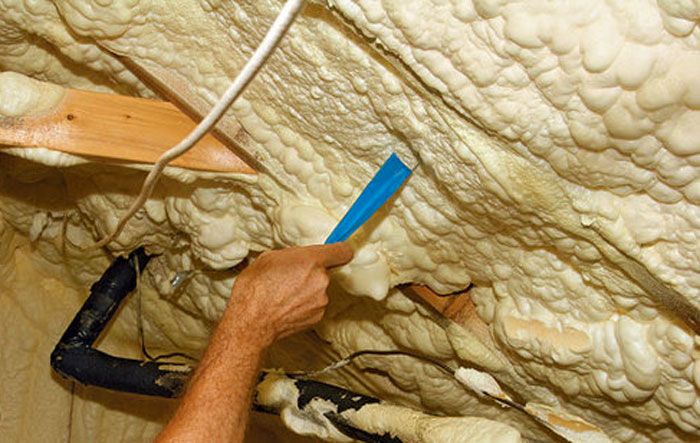Exploring sustainable approaches to spray foam removal
The Key Features of Spray Foam Insulation That Enhance Your Home's Efficiency
Spray foam insulation provides a number of key attributes that greatly improve a home's efficiency. Its remarkable air sealing capabilities create an obstacle against air leak, boosting power efficiency. Paired with high thermal insulation and moisture resistance, it adds to a more comfortable living setting. Understanding these aspects can lead to informed choices regarding home insulation. The advantages expand past convenience and effectiveness, prompting a better evaluation of its overall effect on home maintenance and expenses.
Superior Air Sealing Capabilities

Improved Thermal Insulation
While several insulation materials provide some degree of thermal resistance, spray foam insulation succeeds in developing an extremely reliable thermal obstacle. This one-of-a-kind item broadens upon application, filling up gaps and holes that conventional insulation usually leaves subjected. The closed-cell structure of spray foam significantly minimizes warm transfer, capturing warmth in the winter months and maintaining insides cool down in the summer season.

Additionally, its ability to conform to hard-to-reach locations and irregular forms assurances comprehensive insurance coverage, additional enhancing its shielding buildings. Essentially, spray foam insulation not only meets yet exceeds contemporary insulation criteria, making it a compelling selection for those looking for to enhance their home's energy efficiency.
Moisture and Mold And Mildew Resistance

Power Efficiency and Price Cost Savings
Energy effectiveness is a substantial advantage of spray foam insulation, as it minimizes air leakages and thermal linking, leading to lowered power consumption for heating & cooling. This insulation type expands upon application, filling up even the tiniest gaps and providing a constant barrier. As a result, property owners experience an extra stable indoor temperature level, minimizing reliance on heating and cooling systems.
The enhanced power efficiency equates right into substantial cost savings on energy expenses, making spray foam insulation an economically audio financial investment. Extra resources Gradually, the reduction in power consumption can lead to significant cost savings, justifying the initial setup expenses. Furthermore, several property owners may qualify for energy efficiency refunds, even more boosting the financial benefits.
Flexibility and Application Flexibility
Spray foam insulation uses exceptional convenience and application flexibility, making it appropriate for a selection of structure jobs. This kind of insulation can be applied in varied atmospheres, ranging from domestic homes to business buildings and even commercial facilities. Its capacity to satisfy irregular surfaces permits it to fill voids and voids effectively, ensuring exceptional thermal performance.
In addition, spray foam insulation is available in different formulations, including open-cell and closed-cell types, satisfying particular needs such as soundproofing or moisture control. spray foam removal. It can be utilized in attics, wall surfaces, cellars, and crawl spaces, demonstrating its versatility throughout numerous building and construction scenarios
Furthermore, the ease of application indicates it can be installed quickly, decreasing labor costs and project timelines. Generally, the flexibility and application adaptability of spray foam insulation make it an her response excellent selection for boosting energy efficiency and convenience in a variety of building jobs.
Frequently Asked Questions
How Much Time Does Spray Foam Insulation Last?
Spray foam insulation normally lasts between 25 to 80 years, relying on elements such as application top quality, ecological problems, and upkeep. Its resilience adds significantly to long-lasting power effectiveness and architectural integrity in numerous settings.
Is Spray Foam Insulation Safe for Indoor Air High Quality?
Spray foam insulation, when appropriately mounted and treated, is usually safe for interior air quality. However, it is necessary to ensure adequate air flow throughout application and to choose low-VOC alternatives to minimize possible health and wellness risks.
Can I Use Spray Foam Insulation Myself?
Using spray foam insulation oneself is feasible, but calls for cautious attention to security and application techniques. Experts frequently recommend hiring professionals to assure appropriate installation and stay clear of possible hazards associated with improper handling and application.
What Is the R-Value of Spray Foam Insulation?
The R-value of spray foam insulation typically ranges from 6 to 7 per her latest blog inch, depending upon the formula (spray foam removal). This high thermal resistance makes it a reliable selection for boosting power effectiveness in property buildings
Just How Does Spray Foam Insulation Affect Home Resale Worth?
Spray foam insulation positively influences home resale value by enhancing energy efficiency and minimizing energy prices. Possible purchasers often value the long-term cost savings and comfort it offers, making homes with this insulation a lot more eye-catching in the market.
While several insulation products offer some level of thermal resistance, spray foam insulation succeeds in producing a very reliable thermal obstacle. By lessening dampness invasion, spray foam insulation helps keep a drier environment within the home, thereby enhancing total convenience and safety. Energy efficiency is a significant advantage of spray foam insulation, as it decreases air leakages and thermal connecting, resulting in decreased energy intake for heating and air conditioning. The improved energy effectiveness translates right into substantial expense financial savings on energy bills, making spray foam insulation a monetarily sound financial investment. Spray foam insulation favorably affects home resale value by enhancing power effectiveness and lowering utility prices.